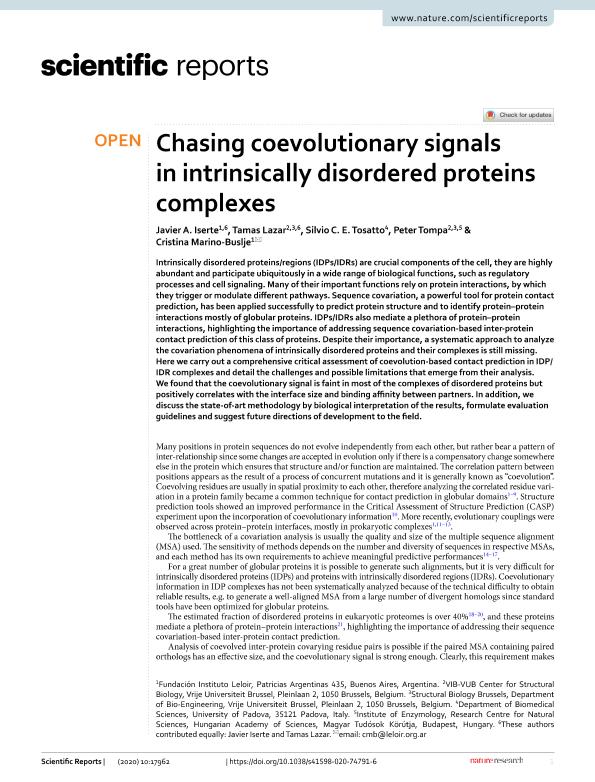Artículo
Chasing coevolutionary signals in intrinsically disordered proteins complexes
Fecha de publicación:
10/2020
Editorial:
Nature
Revista:
Scientific Reports
ISSN:
2045-2322
Idioma:
Inglés
Tipo de recurso:
Artículo publicado
Clasificación temática:
Resumen
Intrinsically disordered proteins/regions (IDPs/IDRs) are crucial components of the cell, they are highly abundant and participate ubiquitously in a wide range of biological functions, such as regulatory processes and cell signaling. Many of their important functions rely on protein interactions, by which they trigger or modulate different pathways. Sequence covariation, a powerful tool for protein contact prediction, has been applied successfully to predict protein structure and to identify protein–protein interactions mostly of globular proteins. IDPs/IDRs also mediate a plethora of protein–protein interactions, highlighting the importance of addressing sequence covariation-based inter-protein contact prediction of this class of proteins. Despite their importance, a systematic approach to analyze the covariation phenomena of intrinsically disordered proteins and their complexes is still missing. Here we carry out a comprehensive critical assessment of coevolution-based contact prediction in IDP/IDR complexes and detail the challenges and possible limitations that emerge from their analysis. We found that the coevolutionary signal is faint in most of the complexes of disordered proteins but positively correlates with the interface size and binding affinity between partners. In addition, we discuss the state-of-art methodology by biological interpretation of the results, formulate evaluation guidelines and suggest future directions of development to the field.
Archivos asociados
Licencia
Identificadores
Colecciones
Articulos(IIBBA)
Articulos de INST.DE INVEST.BIOQUIMICAS DE BS.AS(I)
Articulos de INST.DE INVEST.BIOQUIMICAS DE BS.AS(I)
Citación
Iserte, Javier Alonso; Lazar, Tamas; Tosatto, Silvio C. E.; Tompa, Peter; Marino, Cristina Ester; Chasing coevolutionary signals in intrinsically disordered proteins complexes; Nature; Scientific Reports; 10; 1; 10-2020; 1-9
Compartir
Altmétricas
Items relacionados
Mostrando titulos relacionados por título, autor y tema.
-
Mayol, Gonzalo Federico ; Defelipe, Lucas Alfredo ; Arcon, Juan Pablo ; Turjanski, Adrian ; Marti, Marcelo Adrian (American Chemical Society, 2022-08)
-
Uhart, Marina ; Flores, Gabriel; Bustos, Diego Martin (Nature Publishing Group, 2016-05)
-
Fernández, Julián Francisco; Lavecchia, Martín José (Taylor & Francis, 2020-12-28)




